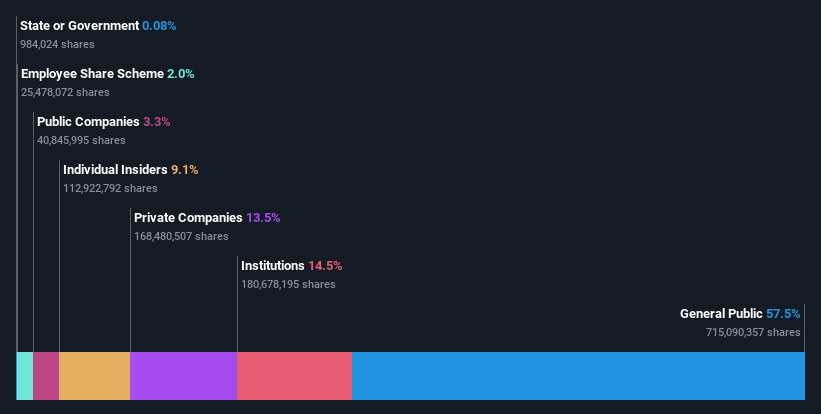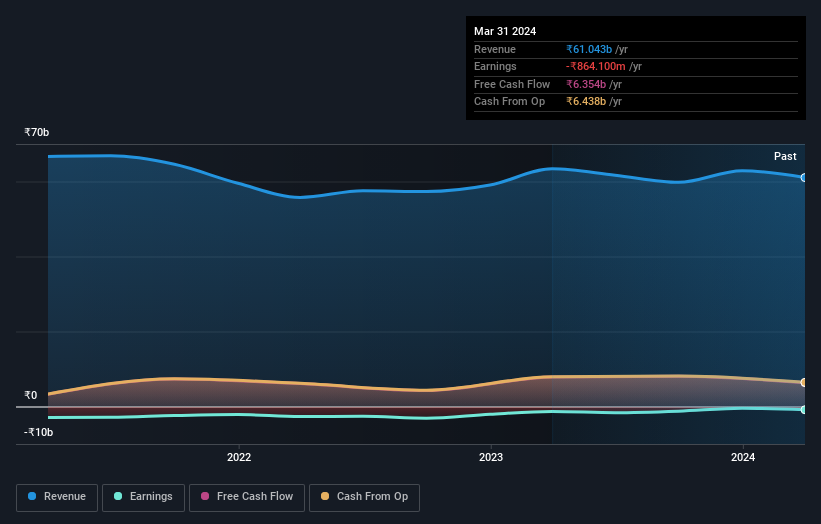Bajaj Hindusthan Sugar Limited's (NSE:BAJAJHIND) market cap dropped ₹4.6b last week; individual investors who hold 57% were hit as were institutions
Key Insights
- Significant control over Bajaj Hindusthan Sugar by retail investors implies that the general public has more power to influence management and governance-related decisions
- A total of 25 investors have a majority stake in the company with 43% ownership
- Institutional ownership in Bajaj Hindusthan Sugar is 15%
Every investor in Bajaj Hindusthan Sugar Limited (NSE:BAJAJHIND) should be aware of the most powerful shareholder groups. And the group that holds the biggest piece of the pie are retail investors with 57% ownership. Put another way, the group faces the maximum upside potential (or downside risk).
While institutions, who own 15% shares weren’t spared from last week’s ₹4.6b market cap drop, retail investors as a group suffered the maximum losses
Let's delve deeper into each type of owner of Bajaj Hindusthan Sugar, beginning with the chart below.
View our latest analysis for Bajaj Hindusthan Sugar

What Does The Institutional Ownership Tell Us About Bajaj Hindusthan Sugar?
Institutional investors commonly compare their own returns to the returns of a commonly followed index. So they generally do consider buying larger companies that are included in the relevant benchmark index.
We can see that Bajaj Hindusthan Sugar does have institutional investors; and they hold a good portion of the company's stock. This implies the analysts working for those institutions have looked at the stock and they like it. But just like anyone else, they could be wrong. When multiple institutions own a stock, there's always a risk that they are in a 'crowded trade'. When such a trade goes wrong, multiple parties may compete to sell stock fast. This risk is higher in a company without a history of growth. You can see Bajaj Hindusthan Sugar's historic earnings and revenue below, but keep in mind there's always more to the story.

Bajaj Hindusthan Sugar is not owned by hedge funds. Kushagra Bajaj is currently the largest shareholder, with 7.7% of shares outstanding. For context, the second largest shareholder holds about 7.1% of the shares outstanding, followed by an ownership of 3.3% by the third-largest shareholder.
On studying our ownership data, we found that 25 of the top shareholders collectively own less than 50% of the share register, implying that no single individual has a majority interest.
While studying institutional ownership for a company can add value to your research, it is also a good practice to research analyst recommendations to get a deeper understand of a stock's expected performance. Our information suggests that there isn't any analyst coverage of the stock, so it is probably little known.
Insider Ownership Of Bajaj Hindusthan Sugar
The definition of company insiders can be subjective and does vary between jurisdictions. Our data reflects individual insiders, capturing board members at the very least. The company management answer to the board and the latter should represent the interests of shareholders. Notably, sometimes top-level managers are on the board themselves.
Most consider insider ownership a positive because it can indicate the board is well aligned with other shareholders. However, on some occasions too much power is concentrated within this group.
Our most recent data indicates that insiders own some shares in Bajaj Hindusthan Sugar Limited. As individuals, the insiders collectively own ₹4.4b worth of the ₹49b company. Some would say this shows alignment of interests between shareholders and the board. But it might be worth checking if those insiders have been selling.
General Public Ownership
The general public, mostly comprising of individual investors, collectively holds 57% of Bajaj Hindusthan Sugar shares. With this amount of ownership, retail investors can collectively play a role in decisions that affect shareholder returns, such as dividend policies and the appointment of directors. They can also exercise the power to vote on acquisitions or mergers that may not improve profitability.
Private Company Ownership
We can see that Private Companies own 14%, of the shares on issue. It's hard to draw any conclusions from this fact alone, so its worth looking into who owns those private companies. Sometimes insiders or other related parties have an interest in shares in a public company through a separate private company.
Public Company Ownership
We can see that public companies hold 3.3% of the Bajaj Hindusthan Sugar shares on issue. This may be a strategic interest and the two companies may have related business interests. It could be that they have de-merged. This holding is probably worth investigating further.
Next Steps:
It's always worth thinking about the different groups who own shares in a company. But to understand Bajaj Hindusthan Sugar better, we need to consider many other factors. Be aware that Bajaj Hindusthan Sugar is showing 2 warning signs in our investment analysis , and 1 of those makes us a bit uncomfortable...
Of course this may not be the best stock to buy. So take a peek at this free free list of interesting companies.
NB: Figures in this article are calculated using data from the last twelve months, which refer to the 12-month period ending on the last date of the month the financial statement is dated. This may not be consistent with full year annual report figures.
Valuation is complex, but we're here to simplify it.
Discover if Bajaj Hindusthan Sugar might be undervalued or overvalued with our detailed analysis, featuring fair value estimates, potential risks, dividends, insider trades, and its financial condition.
Access Free AnalysisHave feedback on this article? Concerned about the content? Get in touch with us directly. Alternatively, email editorial-team (at) simplywallst.com.
This article by Simply Wall St is general in nature. We provide commentary based on historical data and analyst forecasts only using an unbiased methodology and our articles are not intended to be financial advice. It does not constitute a recommendation to buy or sell any stock, and does not take account of your objectives, or your financial situation. We aim to bring you long-term focused analysis driven by fundamental data. Note that our analysis may not factor in the latest price-sensitive company announcements or qualitative material. Simply Wall St has no position in any stocks mentioned.
Have feedback on this article? Concerned about the content? Get in touch with us directly. Alternatively, email editorial-team@simplywallst.com
About NSEI:BAJAJHIND
Bajaj Hindusthan Sugar
Engages in the manufacture and sale of sugar and alcohol in India.
Slightly overvalued with worrying balance sheet.
Market Insights
Weekly Picks


Crazy Undervalued 42 Baggers Silver Play (Active & Running Mine)


Fiducian: Compliance Clouds or Value Opportunity?

Willamette Valley Vineyards (WVVI): Not-So-Great Value
Recently Updated Narratives

TXT will see revenue grow 26% with a profit margin boost of almost 40%

Significantly undervalued gold explorer in Timmins, finally getting traction

Moderation and Stabilisation: HOLD: Fair Price based on a 4-year Cycle is $12.08
Popular Narratives


MicroVision will explode future revenue by 380.37% with a vision towards success


NVDA: Expanding AI Demand Will Drive Major Data Center Investments Through 2026





